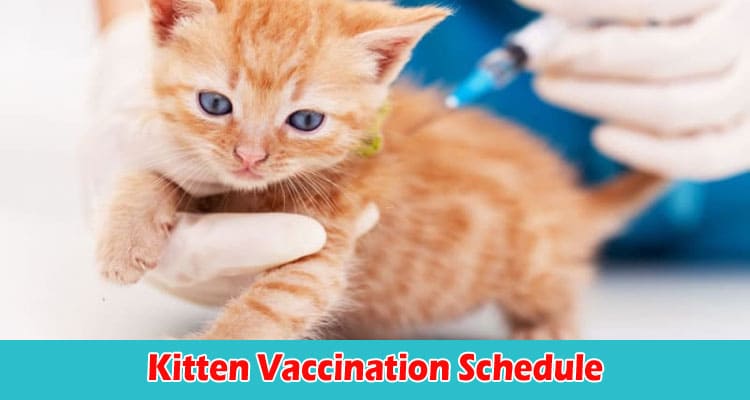Introduction:
Among the most crucial acts you should do to protect your kitten’s well-being and safety is to vaccinate them. A weakened or inactive form of a pathogen is introduced into the human system by vaccinations in a tiny, feeble, or inactivated form, which subsequently induces a protective immunity. This reaction aids in the development of disease resistance in the kitten’s physiology, making the immunological system more equipped to identify and repel the actual infection in the future. The ideal immunisation regimen for your kitten should be determined in consultation with a physician because each kitten is distinct and may require various shots.
Kitten Vaccination Schedule:
Kitten vaccination is an important part of providing proper healthcare for your pet. It’s recommended that kittens receive a series of vaccinations to protect them from potentially deadly diseases. The first set of vaccinations should occur when they are around 8-10 weeks old and should include vaccinations for rabies, feline distemper, and feline calicivirus. Booster shots 12-16 weeks of age are also recommended for all three vaccines. At about 16 weeks of age, kittens should also receive shots for feline leukemia and feline immunodeficiency virus. A final booster shot is typically recommended 1 year later and thereafter every 1 to 3 years depending on the vaccine.
Adult Cat Vaccination Schedule:
Cats over a certain age require vaccinations to stay healthy and protect against diseases. An adult cat vaccination schedule should include regular boosters every 1-3 years depending on the type of vaccine and the cats lifestyle. Core vaccines, including feline distemper, feline calicivirus, feline herpesvirus, and feline leukemia virus, should be administered every 3 years unless specified differently by a veterinarian. Non-core vaccines, such as rabies and feline immunodeficiency virus, can be administered annually or every 3 years depending upon the cat’s risk. Furthermore, cats that travel should also receive an additional vaccine. It is important to have your cat examined annually by a veterinarian and to follow their recommended vaccination schedule.
Additional Vaccinations for Specific Breeds:
Further immunisations, including the vaccine against the feline leukaemia virus (FeLV), may be necessary for certain cat species. FeLV is a virus which mostly frequently spreads through physical intimacy with cats that have the infection. FeLV can induce a number of major health issues, notably cancer and anaemia. Your veterinarian could advise the FeLV vaccine as component of your cat’s vaccination plan if they are more likely to get FeLV, for example if they invest a lot of time outside or when you have numerous cats.
Benefit of Cat Insurance:
It’s also crucial to take into account that immunisations defend cats from specific parasites including heartworm, ticks, & insects in addition to avoiding infections. As a pet parent, it is indeed crucial to think about cat insurance because it can help cover unanticipated medical costs like those for immunisations or diseases. Cat insurance plans generally pay for a variety of costs, such as immunisations, regular examinations, and unanticipated diseases or accidents. Certain insurance plans might also cover behavioural counselling and other types of preventive services, including treating for fleas and ticks.
It’s crucial to take your pet’s individual requirements into account when buying a pet insurance policy, along with your personal financial situation.
Although some plans may charge greater insurance payments but offer more complete coverage, some may charge cheaper rates but exclude certain kinds of expenses from their coverage. To choose the finest insurance alternatives for your cat, it’s wise to shop around, evaluate several plans, and consult your veterinarian.
Conclusion
Immunisation your kitten is a crucial part of guaranteeing their safety and wellbeing, to sum up. The optimal plan for your kitten should be discussed with a vet, along with any additional immunisations that could be required for your particular breed. Retaining their protection to some diseases requires ongoing booster doses during their early adulthood. Also it’s crucial to think about cat protection as a method of covering unanticipated veterinary costs, like those connected with immunisations or diseases. You can guarantee that your kitten develops into a contented, fit adult cat by following these instructions.







